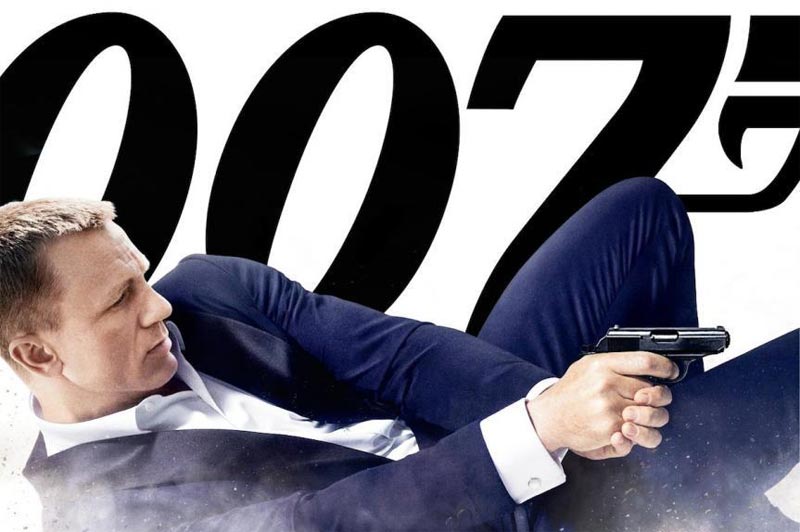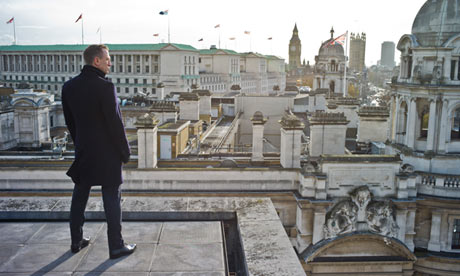by DionysusPsyche
WARNING: SPOILERS EVERYWHERE.
At the beginning of Skyfall, the audience is met with a quandry: is the sacrifice of one life worth more than several to hundreds at the hand of an enemy? Is one extremely intelligent, fast, trained, charismatic agent expendable even without knowing how good the questionable shot to take out the other agent is? Time is a factor, having the enemy in one's hands is a factor, and risk is all wrapped up in it.
At the beginning of Skyfall, the audience is met with a quandry: is the sacrifice of one life worth more than several to hundreds at the hand of an enemy? Is one extremely intelligent, fast, trained, charismatic agent expendable even without knowing how good the questionable shot to take out the other agent is? Time is a factor, having the enemy in one's hands is a factor, and risk is all wrapped up in it.
This
is a similar question to the one we've asked in another blockbuster
movie of not-so-distant past which I am reticient to name (yes, I'm
willing to spoil Skyfall, but not necessarily a movie my jaw dropped
at several times—sorry Double O Seven!). In the unnamed movie, the
hero is met with the answer: that the situation can be avoided
altogether. There need be no question as to whether this person kills
one man or hundreds, there is another way. It may not be a great way,
but it's still a possibility.
But
this is an action film whose name is a legend. Whose films date back
to before your birth (age dependent), whose books date back to
possibly before the birth of your parents (and if they're super
young, your grandparents). It's James [bleep]ing Bond, so naturally,
I said, no, his fictional, impossibly awesome life is not less than
for whom we're aiming. Now, we KNOW going in that Bond is not
actually going to die within the first ten minutes. Do you know how
angered people would be? No one would sign up to write or work that
movie. There would be some Occupy Bond signs, although people WOULD
be in suits, and the rallies would only take place after the 9-5
workday.
However,
from a logistical standpoint, I did not agree. I felt that Eve
(Naomie Harris) wasn't calculated enough. That M was not given proper
information. It crossed my mind that Eve might be working for the
other side (yeah guys, I didn't see the end, get it, moving on). I am
not an employee of national security. I am not prepared and taught
the math of risk, the number of agents at the company's disposal, nor
the degree to which our enemy is wanted—facts of which I am glad.
There was a coldness to M, a precision which the shot itself did not
contain, where she saw no loss, only gain (this not included in her
obituary for Bond which was lackluster at best...no wonder he hated
it). At this juncture, I am required to remind you that as a
subjective member of the audience who is watching a James Bond film,
I am predisposed to root for James Bond. Although his death did lead
into the intro, which made his death sweeter and less horrific.
The
opening to the each film in the series is so incredible that I'm
often left wanting the opening credits instead of enjoying the film
itself. Of course, Adele did the song, because the women of the time
always sing the song of Bond. Sheryl Crowe did, Carly Simon did.
Regardless of appeal, they are popular, accesssible, and are
representative of the time in which the singular work was created.
I
didn't buy M's speech about how we don't need to fear companies, and
the establishment. This is something individuals in power say when
they don't want to accept responsibility for their failed given
action(s). The movie industry and the culture go through phases, and
right now, the phase is the chaotic evil. It would be interesting to
watch all the movies that came out a year after the school shootings
and see if there is a similar pattern, or if screenwriters just flip
a coin every few years. A part of this stems from sarcasm, but I'm
also completely serious. It would also be interesting to compare Bond
films to historical culture, which I am hoping someone does (hint,
hint, nudge, nudge).
I
found the villain from Skyfall to be similar to the Joker from The
Dark Knight inasmuch as he promises to kill people if his demands are
not met and is viewed as highly unstable. Unlike the Joker, we know
this man's past. Information tells us that he's been tortured beyond
comprehension, that he's been handed over to the enemy for an
exchange of goods and services, and that he's even stooped to the
point of biting into a government provided cyanide tablet (capsule?
there's a difference) to bring it all to an end. I DO think certain
individuals are evil and unpredictable, but I don't think that's
cause for letting your good agents go. Even Ralph Fiennes (Gareth
Mallory, and M's superior) agrees with me on that level. Or maybe he
just doesn't want to be held accountable. I think that the first half
promotes the idea that the establishment can't be trusted. M makes
multiple mistakes: letting Bond back in the field, surrendering Silva
(Javier Bardem), letting Eve take the shot that should have killed
Bond, letting Eve stay in the field.
The
villain, to some degree, is relatable. He's been captured and
suffered at the hands of the Other. Turned over by his own people to
die or live a subhuman, abysmal life. M even admits he was one of her
best agents. Here is a question: was her best agent corrupted before
siding against them, or was he assumed guilty and corrupted through
near death, searing pain? M leads us to believe it was the former,
but was it? Bond comes across as her personal sidekick and lapdog, a
poor title for the kicking ass and taking names agent.
One
of my consistent displeasures throughout the last three films is
Bond's lack of gadgets. When I was little, he was all about
technology. In this film, technology, which is representative of the
time (thank you!), is an adherence to completing the task at hand. We
are told by elders, businesses, and parents to turn off our cell
phones, get off the internet, and accomplish things. So while Bond's
lack of gadgetry and willingness to get back to nature seem
consistent with a lesson for the times, it still feels anti-Bond.
Despite
my displeasure with M, she's been compared to Bond's parents. When
Bond takes M to Skyfall, while he is still an international man of
mystery. We're aware that Bond could take M off the grid anywhere; he
could take her to the middle of nowhere, but he doesn't. He takes her
to his origins, maybe because he has connections or because he's
thinking on his toes. He finds his car, he goes to his house, and he
watches it all burn. Why? To save the woman he sees as a mother and a
friend regardless of her shortcomings.
Here's
my question: if Bond thinks of M so maternally, given her choices
good OR bad, why does he take her to the place of his birth? He says,
“I've always hated this place.” Is he lying? Is he being serious?
If his parents actually died here, why does he take M here? To reveal
a part of himself? Or to watch her perish? Since she dies in his
arms, I sincerely hope the latter is not true.
Now
we get to my biggest beef of the movie: when Bond returns to Skyfall,
it is as if a page of an architectural or interior design magazine is
laid out before us. We first see the car, then the stag. As a
pessimist, I expect to see a shack, yet Bond surprises us yet again
with a fully functional mansion that he turns into a shelter.
This
is almost shameful to say, but it needs to be said. If I am the Dark
Knight of sentences, I will say it and be willingly shunned by my
fans. Why doesn't Bond go more Home Alone
on Silva's ass and the hides of his cronies than surrender this
Uncrate meets Restoration Hardware of advertising? I fall in love
with this place starting with the stag at the entrance. The antler
chandeliers, the floor to ceiling wood abience, the smell of old wood
and antique furniture in the air, the amazing cellar/hidden basement
that Bond hides in as a child for two days. But no, Bond listens to
The Bloodhound Gang on his ipod and thinks, “we don't need no
water,” let her burn. Somewhat also reminiscient of The
Dark Knight, where Albert tells
Bruce they burned the forest.
It's
rare for me to go to a film in theatres where I am this ridiculously
frustrated. Were it not for the destruction that ensued at the hands
of Silva, I would completely be on his side. Regardless of “sides”
or grudges, who lets older than God mansions burn to the ground? At
which point, Bond, despite all the rest of the plot had my okay. I
wanted him to end Silva and his henchmen, because damnit, he
destroyed the historical and financial value of the estate. Who does
that?? Only monsters, obviously. Only Bond would live in a fantastic
place, and only in an action film would that place be ultimately
destroyed. That speaks not of England but of America, unwilling to
reconstruct unless it's for a dizzying price.
The
end is pleasurable to Bond fans everywhere, as the story leaves off
at the beginning. We learn that Bond is the first of an industry of
Bonds, and he will go on until another Bond takes his place. Which
finally proves why Daniel Craig looks nothing like any of the other
Bonds. Finally, the fans and I have resolution.
Conclusion:
Overall,
not my favorite Bond film. Of the newer trilogy, I prefer Casino
Royale.
Diehard 007 fans may disagree with me.
Which is okay. I hope those must-see fans enjoy it. Yet don't let the
series override the individual movies. That's my only caution.



No comments:
Post a Comment